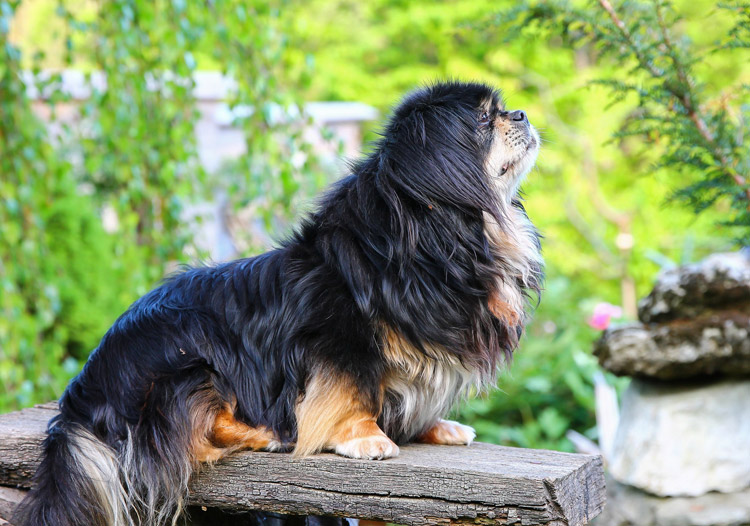
Tibetan Spaniel
Group: Non-Sporting
Origin: Tibet
Height: Approximately 10 inches at the shoulder
Weight: Between 9 and 15 lbs.
Commonly referred to as: Tibby
CLICK HERE to View Breeder Listings
Breed Profile
Originating in the Himalayan mountains of Tibet, the Tibetan Spaniel has been known for over 2,000 years. Bred and owned by Buddhist monks and lamas, “Tibbies” were never sold. They left the monasteries of Tibet only as treasured gifts to esteemed friends.
Legend has it that the Tibetan Spaniels were used to turn the prayer wheels in the monasteries. Although this legend is doubted, they did serve the monks as companions and bed warmers. With their keen sight and hearing, the Tibbies acted as lookouts, lying on the high monestary walls and barking, warning the monks and larger Tibetan Mastiffs whenever anything approached.
Tibetan Spaniels are small, well-balanced dogs measuring about 10 inches at the shoulder. They are alert, intelligent, and do not bark excessively or unnecessarily. Although small, they are quite sturdy, good with other pets and children. However, because of their size, care should be taken when being handled by smaller children.
Like all Tibetan breeds, Tibbies have a double coat — a soft undercoat for warmth and a moderately long, silky outercoat which lies flat.
Health Issues
Like all breeds of dogs, the Tibetan Spaniel may be prone to certain illnesses. If you are considering the adoption of a Tibetan Spaniel puppy, or any breed, it is very important to be selective in choosing a responsible and reputable breeder. Ensure that the prospective puppy’s parents have all health clearances. Breeding of any dog should not be done until after they have been proven to be free of evidence of significant hereditary diseases. (For more information on selecting a breeder, see the articles on the main General Information page.)
Additional Health Resources:
- Canine Health Information Center (CHIC) — Providing a source of health information for owners, breeders, and scientists that will assist in breeding healthy dogs. CHIC is a centralized canine health database jointly sponsored by the AKC/Canine Health Foundation (AKC/CHF) and the Orthopedic Foundation for Animals (OFA).
- Health and Nutrition — Growing section of the Canada’s Guide to Dogs website which includes information on several health and nutrition related issues.
- AKC Canine Health Foundation — Working towards developing scientific advances in canine health.
- Canine Eye Registration Foundation (CERF)
- Orthopedic Foundation for Animals (OFA)
- Ontario Veterinary College (OVC)
- University of Pennsylvania Hip Improvement Program (PennHip)
- HealthGene — HealthGene Corporation is the leading provider of veterinary DNA diagnostic services in Canada.
- Labgenvet — Laboratory of Veterinary Genetics is a Canadian diagnostic laboratory that offers a comprehensive service of DNA tests for veterinary genetic diseases.
Grooming Information
- Grooming — This section of the Canada’s Guide to Dogs website includes tips, articles and information covering all aspects of dog grooming along with a listing of Groomers from across Canada.
Training Resources
- Training — For training information, see this growing section of the Canada’s Guide to Dogs website for tips, articles, as well as listings of training centres across Canada.
Additional Information
- Tibetan Spaniel Network — The source for Tibetan Spaniel breed history and breed-related information — The number one Internet resource for Tibbie owners around the world.
- Clubs, Sports & Activities — For information on the many sports and activities you can get involved in with your dog.
- Working Dogs — The Working Dogs section of the Canada’s Guide to Dogs website provides information and listings of organizations that are involved in various dog jobs, such as Guide Dogs, Therapy Dogs, Police Dogs, Protection Dogs, and much more.
Breed Listing
*NOTE 1: CHIC – The Canine Health Information Center “is a database of consolidated health screening results from multiple sources. Co-sponsored by the Orthopedic Foundation for Animals (OFA) and the American Kennel Club (AKC) Canine Health Foundation, CHIC works with parent clubs to identify health screening protocols appropriate for individual breeds. Dogs tested in accordance with the parent club established requirements, that have their results registered and made available in the public domain are issued CHIC numbers.” To learn more, visit: www.caninehealthinfo.org
*NOTE 2: The Fédération Cynologique International (FCI) is the World Canine Organization, which includes 91 members and contract partners (one member per country) that each issue their own pedigrees and train their own judges. The FCI recognizes 344 breeds, with each being the “property” of a specific country. The “owner” countries write the standards of these breeds in co-operation with the Standards and Scientific Commissions of the FCI, and the translation and updating are carried out by the FCI. The FCI is not a breed registry nor does it issue pedigrees.
Quick Links
Get In Touch
- Email: canadasguidetodogs@gmail.com
- Email: info@canadasguidetodogs.com
- Visit us on Facebook: www.facebook.com/CanadasGuideToDogs
— CanadasGuideToDogs.com is an Amazon Associate as well as a participant in various affiliate programs, as such fees are earned from qualifying purchases.

